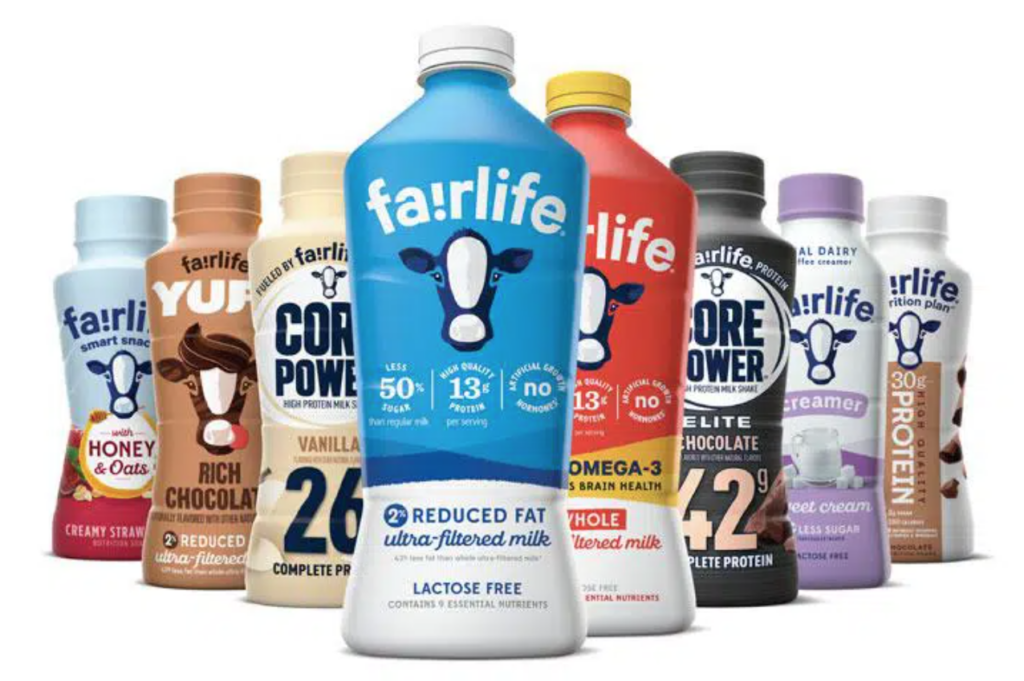The Fairlife milk brand, owned by The Coca-Cola Company, will receive a significant boost of $650 million as the company prepares to construct a new production facility in Webster, upstate New York. Scheduled to commence construction this year, the 100-acre plant will become fully operational by 2025 and will be strategically situated between two key US dairy-producing regions, Rochester and Niagara.
The facility will procure milk from nearby dairy co-operatives to manufacture Fairlife’s drinks, which will then be supplied to retailers throughout the area. The company said the new facility is expected to employ approximately 250 hourly and salaried workers. Fairlife currently owns and operates two production facilities in the US in Coopersville, Michigan and Goodyear, Arizona.
So, why is Coca-Cola betting on Fairlife milk? Here’s everything you need to know about the company, its controversies and why it’s dominating the milk market.
Related: Will Cell-Based Breast Milk Ever Replace Baby Formula?
Fairlife Milk’s Nutritional Value
The Fairlife milk brand was founded in 2012 by husband and wife duo Mike and Sue McCloskey. The couple are dairy farmers and also founded Select Milk Producers, a co-op of 92 family-owned dairies. Fairlife was created to offer a new type of milk that could provide families with better nutrition from the wholesome goodness of real milk.
Fairlife milk boasts 50 percent higher levels of protein and calcium while containing 50 percent less sugar compared to traditional milk, while also being lactose-free. This remarkable achievement was made possible through a novel cold-filtration method, patented by co-founder Mike McCloskey. This process enables the extraction of targeted nutrients such as protein and calcium while isolating fats and sugars from the milk.
In 2015, the milk maven caught the attention of The Coca-Cola Company, which purchased a 42.5 percent stake in Fairlife, with the option to acquire the remaining shares over time. In 2020, Coca-Cola acquired the remaining 57.5 percent stake in the brand to become the sole owners of Fairlife and extended sales nationwide.
In addition to classic dairy milk, Fairlife sells a variety of dairy-based products, including creamers, protein shakes and flavored milk drinks. Its creamers are made with ultra-filtered milk and come in a range of flavors, including hazelnut, caramel and vanilla. Fairlife’s protein shakes are also available in a variety of flavors and contain 30 grams of protein per serving. Its flavored milk drinks come in chocolate, vanilla, strawberry and cookies and cream flavors and contain more protein and less sugar than traditional flavored milk.
“Fair” Life?
Fairlife milk has not been without some controversies since its launch. In 2019, an animal rights group released an undercover video showing workers at one of Fairlife’s milk suppliers, Fair Oaks Farms, abusing calves. The video went viral, leading to protests and boycotts of Fairlife products. In response to the controversy, Fairlife implemented new animal welfare policies and terminated its relationship with Fair Oaks Farms. The company also launched an investigation into the matter.
In addition to the animal welfare controversy, Fairlife has also faced criticism over its marketing. In 2020, a class-action lawsuit was filed against the company alleging that its advertisements promoting Fairlife as “humanely sourced” were false and misleading. The lawsuit claimed that the company’s dairy suppliers engaged in inhumane practices, including the separation of calves from their mothers shortly after birth and sending them to be raised in confinement. Last April, Coca-Cola agreed to pay $21 million to settle the animal abuse litigation.
Standing Out in the Milk Industry
According to data from Information Resources Inc. (IRI), US milk category sales in 2022 exceeded $15.32 billion, representing a year-over-year increase of over seven percent; however, despite the increase in revenue, unit sales declined by 3.3 percent to $4.627 billion. But one standout was Fairlife, which saw both dollar sales and unit sales skyrocket last year.
Research conducted by Fairlife indicated that the majority of Americans still prefer classic dairy milk to alternative options. In fact, nearly three-quarters of Americans choose dairy milk over other types of milk, which can be partially attributed to the nostalgia from childhood memories of milk mustaches.
Whether it be the better-for-you appeal or the crisp, refreshing taste, Fairlife milk has been dominating the milk category, earning over $1 billion in annual retail sales in 2022 and becoming the top selling brand in the value-added dairy category on Instacart. Despite the controversies surrounding the company and the milk industry as a whole, Fairlife is proof that traditional dairy is here to stay.












Join or login to leave a comment
JOIN LOGIN